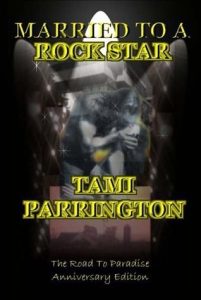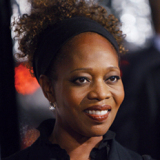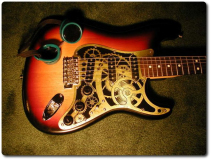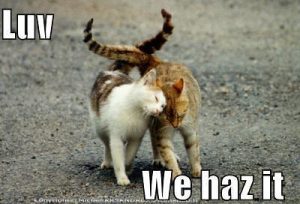 Married to a Rock Star
Married to a Rock Star
by Tami Parrington
published by Prairieview Publishing via Lulu
I read a great review of this book and went immediately forthwith to purchase it. I don’t know whether I’m more upset with the book or with the review, but let’s just say this would’ve been a wallbanger had it not been on my precious ebook reader. I shouldn’t have finished it, really, but I kept reading because I thought surely, somewhere along the way, the heroine would pull her head out of her ass.
Alas.
I wanted to like this book. Really. I thought I would like this book because of the real-life fantasy of it (as in, not elf- fairy- magick-type fantasy). It’s independently published and I want and need to support that community. Thus, I’ve been sitting on this review for several days, thinking about whether I wanted to post it or not.
Here’s the summary:
Out in the country, Karen and her two teenage children have a new neighbor-Isaiah Highland, who is anything but the farm type. Isaiah is a rock-star looking for peace, starving for privacy, and he’s found them both…and a whole lot more. Swept into a world of fame, fortune, and betrayal, Karen finds herself in a world far removed from her little farm.
Two separate worlds….
Worlds bound to collide…
When they do Isaiah and Karen will have to choose between their own versions of paradise…and each other.
Good points:
1. It’s readable.
2. Great concept.
Bad points:
1. Consistent homonym, spelling, and grammar errors that should’ve been caught by a proofreader.
2. Kansas City errors. If you want to get detailed with a city, please know what you’re talking about.
a. There are no stockyards and haven’t been since 1974.
b. Kemper Arena is not a stadium and is not referred to as such by locals.
c. Bryant’s (the one on Brooklyn, which is the one referenced in the book) isn’t a restaurant; it’s a sleazy, nasty, dirty BBQ diner (which was a lot sleazier, nastier, dirtier when Mr. Arthur Bryant was alive and sitting in his straight-backed metal chair with his arms crossed over his chest, right next to the BBQ pit, overseeing the operations with an eagle eye) which does not take reservations and there is no cutting in line and most definitely not at midnight and I don’t care who the dignitary is (uh, with the exception of Jimmy Carter when he was president; I think Clinton chose Gates). Considering I worship at the altar of Arthur Bryant, this is an affront.
3. A 40-year-old 1-year-widowed heroine who:
a. becomes a rock star’s groupie in front of her 15-year-old son and 17-year-old daughter,
b. drags said teenagers back and forth across the country to follow this guy around,
c. tolerates his milieu’s dismissive treatment of her,
d. tolerates him screaming at her in front of Princess Stephanie of Monaco for talking to reporters when she has no idea what the word “groupie” really means,
e. takes the advice of aforementioned 17-year-old daughter who says, in effect, “If you don’t fuck him, the groupies will,” so she does,
f. goes back to him after he’s abandoned her 90 miles from home with no cash and slaps her (in front of aforementioned teenagers and his entire milieu),
g. tolerates the groupies anyway,
h. seems to have no grasp on how her behavior can/will affect her already angst-ridden children (their father died barely a year ago, remember) and if she does, doesn’t seem to care, and
i. doesn’t seem to love the guy in the first place, or at least if she does, I see no reason why she should and she never indicates by thought, word, or deed that this is anything but an exciting fling for her, no matter how degrading.
4. No comeuppance for the, ah, “hero,” who begins the “I love you” business as a bargaining chip.
And you know, I could’ve gone with it and had snarkworthy fun with it had not children (impressionable teenagers, yet) been involved in her rapid and willing debasement. For that, I felt dirty after reading this book and I finished it wondering if the reviewer (whose recommendation I took) and I read the same book.










 Harlequin. I *lurrrrve* you.
Harlequin. I *lurrrrve* you. Late to the party, as usual. LibraryThing has been on my to-do list forever, and I finally
Late to the party, as usual. LibraryThing has been on my to-do list forever, and I finally